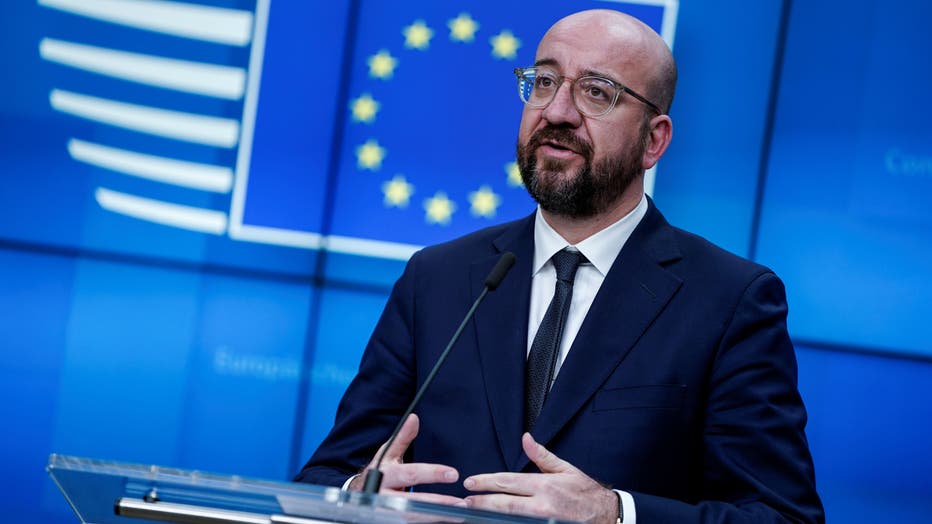EU chief proposes 30-day ban on nonessential entry into bloc
BRUSSELS (AP) - The European Union's top official on Monday proposed a 30-day ban on anyone entering the bloc unless their travel is essential, to slow the spread of the novel coronavirus, while insisting on the need to keep the internal borders between the 27 member states open as much as possible.
RELATED: CoronavirusNOW.com, FOX launches national hub for COVID-19 news and updates.
Speaking after an extraordinary video-conference meeting of the leaders of the G-7 countries, European Commission president Ursula von der Leyen said travel restrictions should be in place for an initial period that can be prolonged if necessary.
“The less travel, the more we can contain the virus," von der Leyen said.
She said long-term residents in the European Union, frontier workers, family members of European Union nationals and diplomats would be exempted from the restrictions.
RELATED: CDC’s ‘flatten the curve’ graphic shows why social distancing amid coronavirus pandemic is necessary
“Essential staff such as doctors, nurses, care workers, researchers and experts that help address the coronavirus should continue to be allowed in the EU," von der Leyen added. “People transporting goods are exempted too. Why that? Because the flow of goods to the European Union must continue to secure the supply of goods, including essential items such as medicine, but also food and components that our factories need."

EU President of Council Charles Michel speaks during a joint press conference after a G7 Leaders' videoconference on COVID-19 at the EU headquarters in Brussels on March 16, 2020. (Photo by KENZO TRIBOUILLARD/AFP via Getty Images)
After the surge of COVID-19 cases in Europe led the Italian government to put the country on lockdown, other member states have implemented drastic measures and travel restrictions, including partially closing their borders.
Von der Leyen urged member states to coordinate on the European level to ensure goods and essential services continue to flow in the internal market.
RELATED: Flight change fee waivers, cancellations: This is how major airlines are reacting to COVID-19
European Parliament president David Sassoli agreed that strengthening controls at the external borders of the EU could have a positive effect, but warned against the reintroduction of unnecessary internal border controls.
“It imposes major economic costs on the EU as a whole and prevents goods from reaching where they are needed," he said.
RELATED: Coronavirus: What to do if you’re told to self-quarantine
European Union leaders are set to hold a summit via video-conference Tuesday on efforts to contain the spread of the virus, which has now infected more than 50,000 people across Europe, and claimed more than 2,000 lives.
With Italy reporting the most virus cases and deaths anywhere in the world except China, neighboring countries including Austria and Slovenia have moved to slow traffic. But other EU nations, including Germany, Poland, Slovakia and Cyprus have also introduced restrictions that could damage the bloc's economy and slow down the circulation of medical equipment.
The EU is urging its members to put common health screening procedures in place at their borders to limit the spread of the virus, but not to block the transport of important medical equipment.
In a series of guidelines for border management measures, the commission urged member states to facilitate the circulation of workers, to ensure an efficient movement of goods and to impose restrictions only when they are “duly motivated" and science-based.
“Member States should preserve the free circulation of all goods. In particular, they should guarantee the supply chain of essential products such as medicines, medical equipment, essential and perishable food products and livestock," the commission said.
Jon Worth, a visiting lecturer at the College of Europe in Bruges, said he was not surprised that member states decided to restrict the movement of people at their borders given that health care is a matter of national responsibility in the EU.
RELATED: Coronavirus cancellations: These major events, concerts called off amid COVID-19 outbreak
“But the single market is definitely the EU’s responsibility and they have to make sure the chain of supply does not break down," he told The Associated Press on Monday. “That will be the short-term challenge to come.”
For most people, the virus causes only mild or moderate symptoms, such as fever and cough. For some, especially older adults and people with existing health problems, it can cause more severe illness, including pneumonia.
“Essential goods and medicines must be able to cross borders as smoothly as possible. This is a time for solidarity and cooperation,” EU Health Commissioner Stella Kyriakides tweeted, after hosting a separate virtual meeting of the bloc’s health ministers Monday.
EU finance ministers were also set to hold coronavirus talks by computer later Monday, as the disease and the efforts to combat it take their toll on the bloc’s economy.
Worth also noted that the EU's limited financial means were a major obstacle in the response to the crisis and that deploying the medical aid needed across the bloc with a very restricted budget was a tall order.
“The total British NHS budget is larger than the EU's total budget for everything per year,” he said. “At EU level, you don’t have the means to sort out this problem.”

